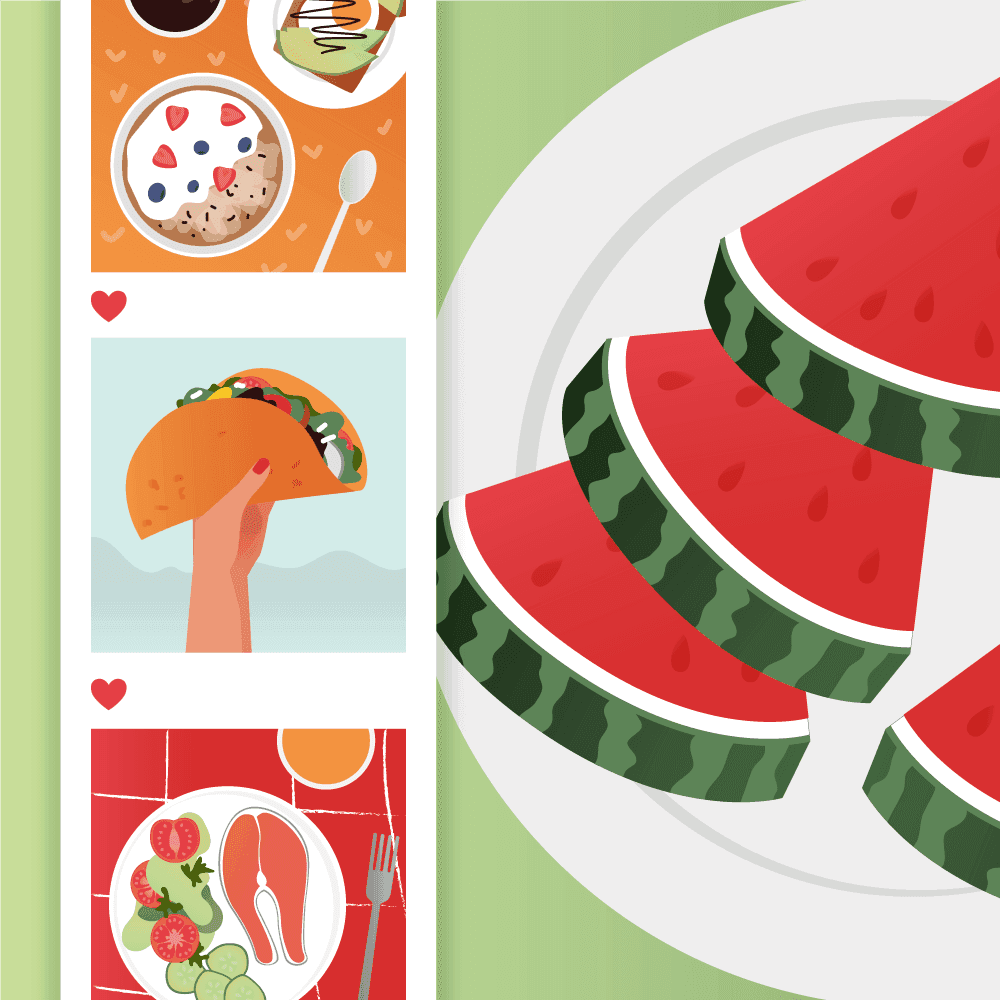Meal Plans
Eating for Healthy Skin: Meal Plans & Tips for All Types of Eaters
Written by Thien NguyenUpdated on 06 Aug 2024
Meal Plans
Eating for Healthy Skin: Meal Plans & Tips for All Types of Eaters
Written by Thien Nguyen.Updated at 06 Aug 2024
With so many different types of diets nowadays, have you ever wondered what kind of effects they will have on your skin? Well, look no further! In this blog, Luvly will spill the beans on the science behind eating healthily for the skin and introduce you to some delicious recipes.
Healthy skin starts with what you're eating every day. Well-documented studies have demonstrated that a healthy diet lets you take in essential nutrients that rejuvenate skin appearance and overall well-being.
Exciting, right? Let's dive right in!
Different types of diets - scientific facts and recipes
"Everything you eat becomes a part of not only your inner being but the outer fabric of your body as well. The healthier the foods are that you consume, the better your skin will look", says Samantha Heller, MS, RD, a clinical nutritionist at NYU Medical Center in New York City. However, eating for healthy skin doesn't have to be boring. In fact, there are so many options that could work for you. Starting withVegetarian
A plant-rich diet can play a major role in improving inflammatory conditions such as acne, as well as giving you a healthier appearance overall. A recent study has shown that a whole-food, plant-based (WFFB) diet significantly prevents skin aging. It maximizes the antioxidant potential within our cells by providing essential vitamins, including vitamins A, C, and E. It also helps to eliminate harmful carcinogens within our bloodstream, which prevents cellular damage. Vegetarian Recipe: Minty Vietnamese summer rolls These easy vegetarian summer rolls are fresh, light, filling, easy to make, and are such a flavor bomb. Paired with a delicious peanut sauce, this recipe is a perfect choice for hot summer days. If you’re plant-based and need to spice up your diet, add these to your weekly meals.Vegan
Following a vegan diet means cutting out all animal-related products like dairy, which is actually even better for the skin. In a recent study, scientists point out that dairy products like cow’s milk and yogurt contain whey protein (which elevates insulin) and casein (which leads to high IGF-1 levels). These are directly linked to the development of acne in teenagers and young adults. So, if you're suffering from acne and inflammation, going vegan is a positive choice for you. Vegan Recipe: Mango, chili, and lime quinoa salad This creative recipe will make you see salads as more than just a bed of greens. Fresh, juicy mango and sweet golden raisins are mixed with zesty lime juice and spicy diced chilis. The greens are tossed with quinoa, crisp red onion, and bell pepper, then combined with the fruit and topped with pecans and pumpkin seeds for crunch and protein.Pescatarian
Pescatarianism could also benefit your skin. Swapping out meat (especially red meat) for fish and other protein sources could be a wise move for your health. A 2014 study published in the Journal of Clinical and Aesthetic Dermatology linked higher meat consumption with an increased risk of skin cancer. Another piece of research also points out that the omega-3 fatty acids that occur naturally in many fish types are essential to your skin health, helping to manage its hydration, reduce signs of aging, protect it from sun damage, and also help people who experience acne. Pescatarian recipe: Spicy tuna avocado fish taco The combination of rare silky tuna and creamy avocado fit a boatload of healthy fat into the palm of your hand, but the flavors are tough to beat, especially when crowned with a spicy slaw and the tang of a few pickled onions. Forget the fried version: this is your new fish taco recipe.Keto
The keto diet has become trendy in recent years, with tales of throwing calorie counting out the window and feasting on plates of bacon. The most basic, simple premise is to consume almost no carbohydrates. Despite all the benefits keto can bring to patients with diabetes and epilepsy, keto may not be the best choice if you’re looking to improve your skin. The key to a ketogenic diet is low carbohydrates. Sometimes, you have to minimize vegetable and fruit consumption to cut down your sugar intake, which is essential for healthy skin. That's why it's not really recommended to follow the Keto diet if you're searching for skin benefits. Keto Recipe: The healthy, low-carb butter chicken salad There's nothing quite like butter chicken - fragrant, spicy, warming, and downright comforting. That's why we want to introduce you to this healthy, low-carb version that tastes just as good without blowing your healthy eating streak.Gluten-free
Gluten has gotten a lot of attention in recent years. Some people believe that eating gluten can inflame the skin and, therefore, cutting it out will help relieve red, inflamed skin or other skin conditions, such as psoriasis or eczema. But in reality, cutting gluten from your diet will only help if you actually have celiac disease or hypersensitivity to gluten. If you don't, the gluten probably isn't affecting your skin, and cutting it out of your diet won't have any effect on your skin. It's also important to keep in mind that cutting major food groups from your diet unnecessarily can leave you at risk for nutritional deficiencies and could actually lead to health problems. Gluten-free recipe: Japanese cabbage pancakes with avocado This yummy, giant gluten-free okonomiyaki loaded with healthy veg is perfect as a nourishing green breakfast. This dish includes zucchini and avocado, mixed with aromatic sesame oil, and will be super delightful to your taste buds.The ABCs of eating for healthy skin
Have you ever wondered, with so many diet options out there to choose from, how can you know which one is healthy for the skin? Well, worry no more, we got you! These ground principles will definitely help you make the right decision, whether you're a protein lover or a plant-based enthusiast. Fruit, vegetables, and berries are your best friends Fruits like mangoes, bananas, blueberries, etc., are rich in antioxidants, vitamins A, B, E, and beta-carotene (a precursor of vitamin A), which is synthesized in the skin. A study has shown that oral intake of beta-carotene helps reduce UV-induced redness in humans. It is also said to prevent premature aging, retain the skin’s elasticity, and help the growth of new skin cells. Some other citrus fruits like oranges and kiwis are rich in vitamin C, which delays wrinkles and boosts collagen synthesis. They also protect the skin from sun damage and promote cell turnover, thus preserving the youth and beauty of your skin.Healthy fats from different sources
Healthy fats are great for your skin. Fish and fish oil are rich in omega-3 fatty acids. They provide the skin with a healthy dose of natural oils (good fats) to reduce inflammation, acne, and redness. Consuming fatty fish like tuna, salmon, and carp or taking fish oil supplements is essential for healthy, glowing skin. Other sources of healthy fats (omega-6 fatty acids) are nuts (almond, walnut, macadamia, etc.), seeds (flaxseed, sunflower seed, chia seed, etc.), healthy oils (olive oil, rice bran oil, etc.). Nuts, seeds, and oils are great options for vegans and vegetarians to nourish their skin, improve its structure, and heal wounds. Include them in your diet in adequate amounts to get flawless skin.Choose a variety of whole grains
Whole foods are basically unprocessed – whole wheat bread instead of white bread, for instance. Whole grains deliver a wider variety of important nutrients, including vitamins, minerals, protein, fiber, and other healthy plant compounds compared to processed food. Whole wheat is a great source of zinc, vitamin E, and selenium, which makes it beneficial in fighting against acne, nourishing the skin, preventing skin cancer, and protecting from sun damage. Also, its high fiber content maintains the digestive system by removing all the toxins from our body and makes skin youthful and smooth. And no matter what you're doing during the day, remember to stay hydrated – drink water. Hit the mark of 2.5 liters a day consistently, and you'll notice a remarkable difference in your skin.What to avoid
The list of healthy foods could go on and on, but also, let’s remind ourselves of the enemies of your skin that you should avoid. They are:- Alcohol
- Spicy foods
- Processed and junk foods
- High-sodium and high-sugar foods
- Oily foods
- Foods containing high levels of estrogen
- Foods that increase the internal body temperature
- Overcooked or partially charred foods (kebabs)


